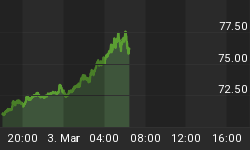For the life of me I can't remember who it was. But some time back, I read an entertaining article by a fellow market watcher who took issue with the notion, if not the modern legend, that Federal Reserve Chairman Alan Greenspan had set a new standard for central bankers by guiding the U.S. economy and financial markets so steadily for (now) nearly 18 years. Sure, there were occasional bumps along the way; but for the most part, Greenspan is widely praised for his steady hand on the steering wheel.
Not so, wrote the particular pundit I have in mind. The Maestro's record is replete with examples, he protested, of how Greenspan may indeed have kept us all on the road somehow, but has often veered wildly from one side of it to the other.
Just the last few years give credence to this less-than-respectful take on the Chairman. Greenspan lurched toward providing unprecedented levels of liquidity as a way to (first) save us from much fallout from the foreign currency crises of the late 1990's and then (second) from whatever troubles the feared Y2K phenomenon would throw our way. As a consequence, he created an outsized speculative bubble on Wall Street.
Then the Maestro - his hands on the wheel - suddenly swung the other way. He raised interest rates and drained at least some of this excess liquidity. The result: the bursting of the dot-com bubble, and the greatest misery for stock market investors in a generation.
Gripping the wheel firmly, Greenspan "zagged" back toward the other side of the road anew. Due first to the market's deterioration and, then, the debilitating economic and financial shocks following the attacks of September 11, 2001, Greenspan proceeded to break his own late-1990's records for monetary and credit expansion. Interest rates were moved back down, ultimately to next-to-nothing. Dangerous new bubbles have thus been created in housing and consumer credit, while those on Wall Street have been reinflated to some degree.
The question NOW is whether-having already moved away from the guardrail a bit via the Fed's relatively modest tightening so far-Greenspan is AGAIN gripping the wheel tightly as he prepares once more to veer back toward the other side of the road.
Having now hooked a MUCH larger percentage of the populace on his E-2 money policy than was the case during the Nasdaq bubble, you would think that Greenspan would hesitate before tightening credit conditions too drastically. Until recently, I wasn't of the opinion that he'd do it; after all, doesn't he know that American consumers - and, arguable, many players in the financial casinos - are more leveraged than ever?
Now I'm not so sure. As many of you have no doubt read, Greenspan and company have recently been "telegraphing" the possibility that the pace of rate hikes might be accelerating soon. The chairman gave a grin personal warning of this at a bankers' confab in Germany last month. Also last month, as we recently learned, the Federal Open Market Committee seemingly had a Road to Damascus-style conversion. Having engaged in such an extraordinary expansion of credit, at rock-bottom rates and for virtually any purpose, the F.O.M.C. has suddenly started to acknowledge the consequences of its actions. A falling dollar which has actually INCREASED the trade deficit by, in part, making our copious imports of oil more expensive in dollar terms. Speculative activity in the housing market. Ditto in the financial markets.
The interesting (and somewhat sobering) thought is that the F.O.M.C.'s epiphany may now motivate it to act more aggressively.
Most urgently on the Fed's mind, it seems to me, is the health of the U.S. dollar. Together with the Bush Administration, the Fed been seemingly in favor of a weakening dollar, as a means of reducing the trade deficit, etc. Clearly weakening green back has not had that effect, and for two reasons. First, it has dept Americans consuming far beyond their means; and with more and more of what we consume coming from foreign lands, imports have soared.
Second, the biggest of those imports by far has been OIL. The weakening dollar has caused dollar-denominated oil (and other commodities) to soar, exacerbating our imbalances even more (such as in November, when the trade deficit hit a MONTHLY total of $60 billion for the first time).
Alan Greenspan may be stupid, but he's not dumb. Having finally figured out that a weaker dollar was causing our trade and current account deficits to widen alarming, he seems set to do something about it. That something is to raise interest rates-and strengthen the dollar-sufficiently to reverse those deficits' unsustainable trends. That means what to most people is virtually unthinkable; and was to yours truly. And that is, that Greenspan INDEED IS about to swerve once more.
Lest you think he wouldn't dare risk America falling into recession anew, consider his (and the U.S. Treasury's) Number One Priority: their creditors. This won't be the first time that the Greenspan-led Fed has raised rates sharply in an attempt to placate holders (increasing in foreign lands) of U.S. paper and cure growing imbalances. The spring and summer of 1987 are the most notorious example, when Greenspan was newly at his post, no less.
In summation, the impending acceleration in the Fed's monetary "accommodation" removal has implications, at least over the coming several months, for which the average investor is unprepared. This is especially true if you have been enjoying the great bull markets in most manners of commodities, and have become a bit too complacent for your own good. At least for a while, I would not want to be betting heavily against the Fed's newfound resolve. And I can only hope that - as Chairman Greenspan swerves to the opposite side of the road once more - we aren't all met by an oncoming truck!
Chris Temple has just completed his latest Special Report entitled "What's Up-or Down-With the Dollar for 2005?" For more information, visit www.nationalinvestor.com
















